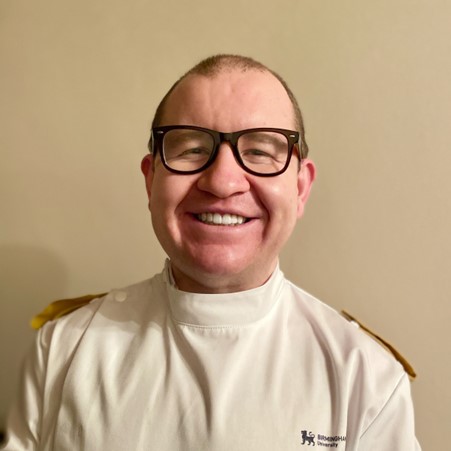Diagnostic Radiographer
A diagnostic radiographer uses technology to look inside the service users’ bodies, to understand the cause of their illness.


Ben Potts
I am a mature student that has studied at university before. I have a different background from most radiography, or in fact any healthcare, student.
In 2010, I started my first degree in music technology, which I immediately followed up with a PhD. Music was at the forefront of my career, but I was always more interested in how humans perceive music and the human element involved, and because of this, I completed an MSc in audiology in 2018.
I was severely ill in 2018 and needed to take some time out to recover. I had an episode of major depression alongside panic disorder, and I was struggling with addiction.
Whilst I was recovering, I became the full-time carer for my grandmother who had Alzheimer’s disease. I saw a fork in the road where I could continue to advance my career in research/academia or do something that had always been in the back of my mind.
Since childhood, I have been interested in healthcare, originally wanting to be a vet, and then a nurse. Caring for my grandmother and being a patient myself, my interest in healthcare professions was reignited.
I looked at the list of allied health professions for inspiration. I had had x-rays before, so diagnostic radiography jumped out at me. From looking it up, I was drawn in by the chance to work with incredible applications of science and technology, all while providing vital images to help diagnose and monitor people’s illnesses and injuries.
Having a background in music technology, this technological aspect clicked with me. I was also drawn to the vast number of opportunities in radiography, which includes MRI, CT and theatre. I ultimately decided I wanted a career that made a difference and directly helped people.
The interactions I have with patients have turned out to be what drives me and what I love the most about the role
With my background, I knew that learning the technical side of it would not be too much of a stretch. Equally, I was not worried about entering into a degree programme and studying again.
However, I was incredibly nervous about the patient interaction element. I was worried I would not know what to say to patients and if I could support them if they were frightened or upset.
It turned out that I should not have worried. The interactions I have with patients have turned out to be what drives me and what I love the most about the role.
I love meeting new people, doing what I can to aid their journey through the hospital and I feel like I am making a real difference. I am passionate about providing the best care I can for patients.
With repeated use, the technology soon becomes old, but the bond you can form with patients, in such a short amount of time, can be so compelling.
During my course, at the age of 31, I was diagnosed with ADHD. I had already been diagnosed with dyslexia at age 23. It has been life-changing as it explains so much about my life.
I have received some brilliant support from the university after disclosing this to them and explaining how it impacts me. I am very aware that some neurodivergent students require more support and I wanted to do what I could to help with this.
Jade Wareham, an apprentice nurse, and I founded SSHINE (@SSHINE_Students). We are a group of neurodivergent students studying different healthcare professions from across the UK. Our aim is to use our lived experience to create resources to support other neurodivergent students.
We are currently in the process of working with Health Education England to write their guide to neurodiversity and placement. I believe having a correct diagnosis and having a better grasp of myself has made me more self-accepting, more resilient but also more empathetic and a better healthcare professional.
I love that I can always make a difference and choosing a career in radiography is the best decision I have ever made
In radiography training, we tend to rotate through different imaging departments quite quickly. I could be in A&E x-ray, CT, MRI, nuclear medicine, ultrasound, theatre, interventional and many more. We also tend to work shifts, including some weekends, nights and long days.
When I am not on placement, I am attending lectures or practical training on the university campus or watching a remote class from home.
As well as SSHINE, I am also involved in other groups that advocate for students. I am the current vice-chair of the Society of Radiographers’ Student Forum. I joined the student forum and had a committee role from year 1 of my course. It is a fantastic opportunity to get involved in shaping the future of the radiography profession, meet some amazing people and practice my leadership skills.
Even on the bad days, when I feel that I have made lots of mistakes, forgotten things I should know, or had a knock to my confidence, I always walk out of the hospital and feel a huge sense of reward.
I know that I have played a vital part in many people’s diagnoses or monitoring that day. I could have helped in spotting something important that they can now get treatment for.
I also know that I might have made going through the experience of being unwell in hospital a little bit better for someone. I might have made them laugh, showed them I care or made them feel safe. I might have just been a smiling face in a sea of confusion. I love that I can always make a difference and choosing a career in radiography is the best decision I have ever made.